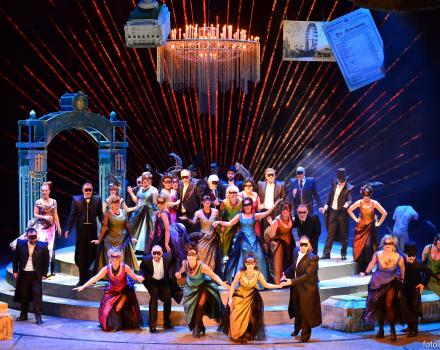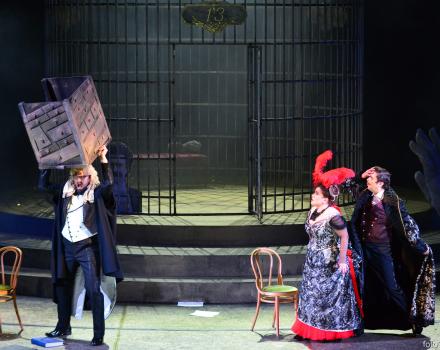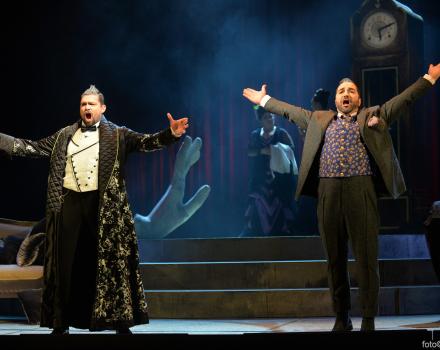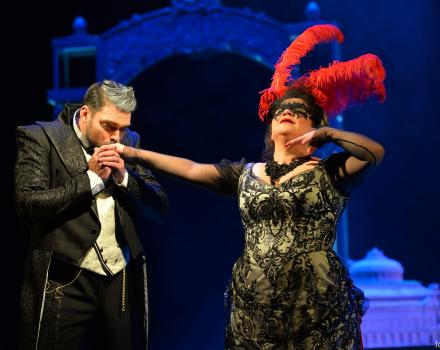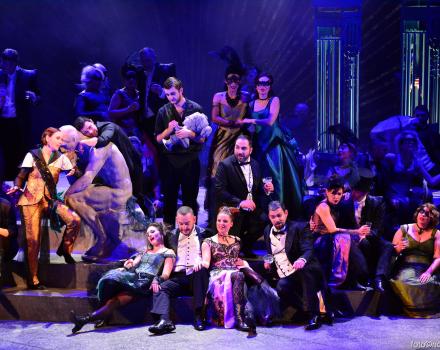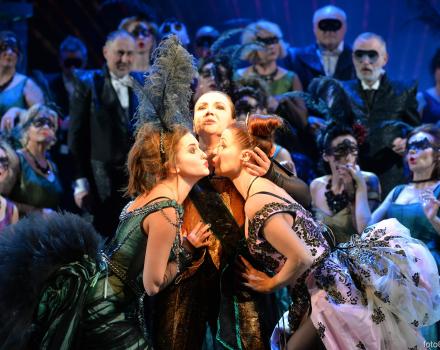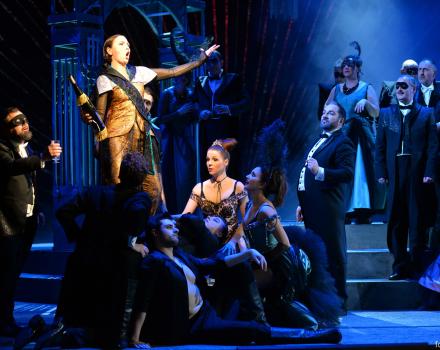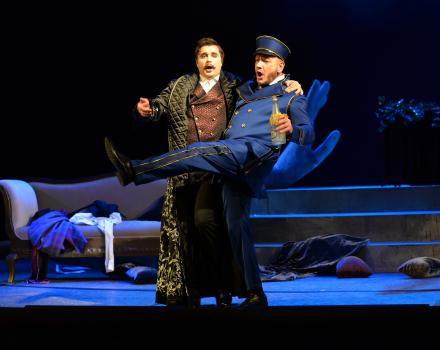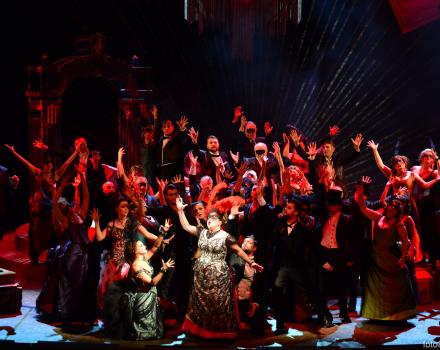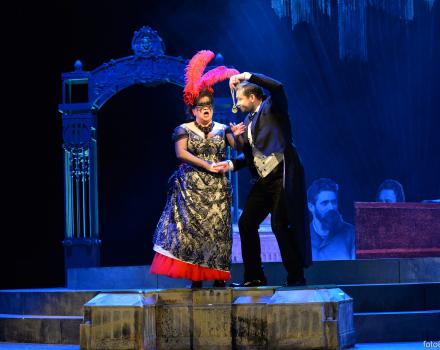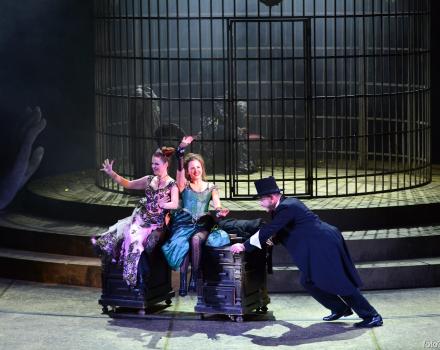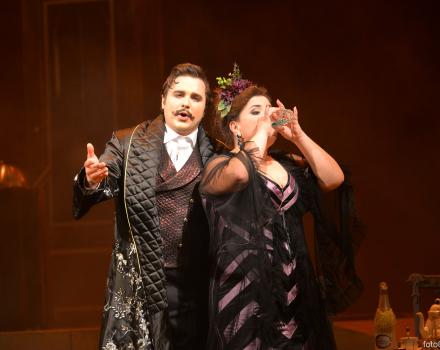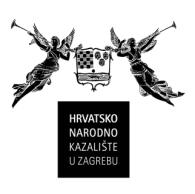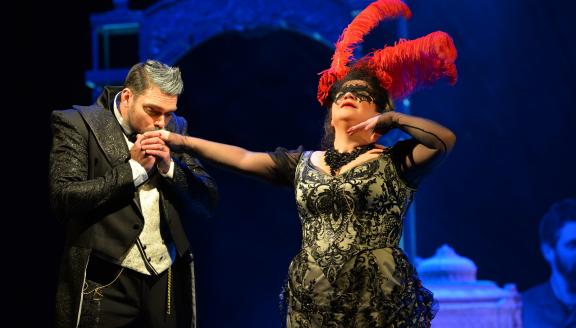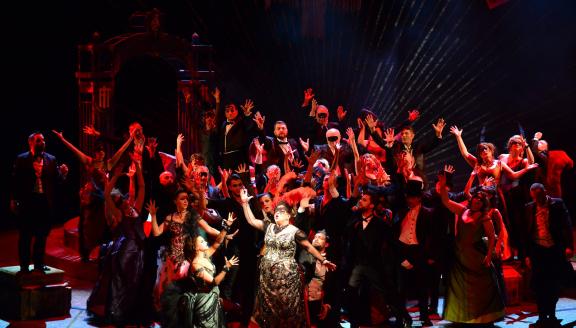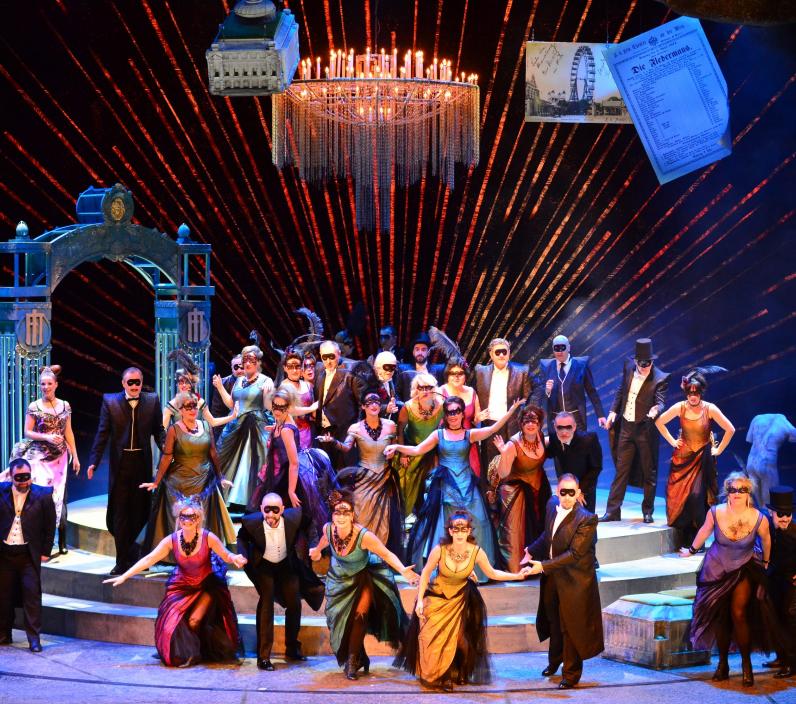
The most brilliant of Austrian operettas takes us to the outskirts of romantic Old Vienna. It’s New Year Eve and we are in the company of Rosalinde, who is determined to teach her philandering husband Eisenstein a lesson, even while she is being pursued by her former beau, the operatic tenor Alfred. At the centre of the action is the extremely wealthy, eternally bored Prince Orlofsky, whose lavish masked ball brings everything to a most delicious boil. But what if the whole plot has been a cunning plan masterminded by someone just to get back at Eisenstein?
Die Fledermaus, Johann Strauss II’s comic operetta in three acts which premiered in 1874, has become a synonym of the operetta genre. In only six years, the operetta was staged in more than 170 theatres in the German-speaking regions and, by the 1890s, was performed all over the world. The libretto was written by Richard Genée and Karl Haffner after the burlesque The Prison by Julius Roderich Benedix and vaudeville piece Le Révellion by Henri Meilhac and Ludovic Halévy. Die Fledermaus nonetheless keeps all the orchestral and vocal features of a comic opera from the time of Mozart and Rossini. OperaVision travels to Zagreb for a live performance, as staged during the festive season in theatres around the globe. Sung in Croatian, this production is conducted by Srba Dinić and directed by Krešimir Dolenčić.
CAST
|
Gabriel von Eisenstein
|
Domagoj Dorotić
|
|---|---|
|
Rosalinde von Eisenstein
|
Valentina Fijačko Kobić
|
|
Adele
|
Marija Kuhar Šoša
|
|
Dr. Falke
|
Ljubomir Puškarić
|
|
Alfred
|
Roko Radovan
|
|
Orlofsky
|
Emilia Rukavina
|
|
Frank
|
Ozren Bilušić
|
|
Dr. Blind
|
Ivo Gamulin
|
|
Ida
|
Josipa Bilić
|
|
Johann Strauß ml.
|
Drew Jackson
|
|
Pratnja Orlofskog
|
Dominik Čičak
Tomislav Dunđer
Lorenzo Raušević
|
|
Konobari
|
Siniša Bosnar
Vladimir Knežević
Domagoj Vrbljanin
|
|
Orchestra
|
Croatian National Theatre Zagreb Orchestra
|
|
Chorus
|
Croatian National Theatre Zagreb Chorus
|
| ... | |
|
Music
|
Johann Strauss II
|
|---|---|
|
Text
|
Richard Genée
Karl Haffner
Vladan Švacov (Croatian translation)
|
|
Conductor
|
Srba Dinić
|
|
Director
|
Krešimir Dolenčić
|
|
Sets
|
Stefano Katunar
|
|
Costumes
|
Alan Hranitelj
|
|
Choreography
|
Leo Mujić
|
|
Lights
|
Deni Šesnić
|
|
Chorus master
|
Luka Vukšić
|
|
Assistant director
|
Kristina Grubiša
|
|
Associate costume designer
|
Petra Pavičić
|
|
Sets Assistant
|
Aleksandra Vukićević
|
|
Ballet master
|
Andrej Barbanov
|
| ... | |
Videos
The story
Act I
The chambermaid Adele is invited (or so she believes) by her sister Ida to attend a ball given by Prince Orlofsky. After some difficulty she succeeds in getting the night off by inventing a moving story about a sick aunt. Meanwhile her employer, Eisenstein, a man of independent means, has recently been given a prison sentence for insulting a public official. But rather than reporting to serve the sentence, he is persuaded by his friend Dr. Falke to join him for a night of revelry at Orlofsky’s. Dr. Falke is following his own agenda – Eisenstein once humiliated him in front of the whole town by leaving him to return home from a masked ball through the streets, drunk and dressed as a bat, and Falke now sees his opportunity for revenge; and so he also invites Eisenstein's wife Rosalind to the ball. Due to Eisenstein’s departure ‘for prison’, Rosalind is already in disarray when a former admirer of hers named Alfred shows up and tries to woo her, only to be arrested by prison governor Frank who takes him for Eisenstein. Frank, satisfied by a job well done, then also decides to attend Orlofsky's ball.
Act II
At the ball, Dr. Falke’s machinations play out splendidly: to Eisenstein’s astonishment he meets his chambermaid Adele, who brazenly denies her identity; he befriends a French ‘chevalier’ – in truth none other than prison governor Frank; and finally he falls in love with his own wife, masked and disguised as a Hungarian countess.
Act III
The knots begin to unravel. The action takes place at the prison, a rather shady affair thanks to Frosch, the permanently drunk gaoler. One by one, the characters reappear: first prison governor Frank, extremely hungover, then Adele, who is hoping to find a patron to foster her dramatic talent, along with her sister Ida, and then Eisenstein, who is astonished to find that he has apparently been locked up all night. When Rosalind also appears and, together with Alfred, demands an interview with a lawyer, Eisenstein dons a disguise and takes the place of the stuttering lawyer Dr. Blind. This trick allows him to get to the bottom of the previous evening’s events. Fortunately, he then allows himself to be convinced that everything was a part of Dr Falke’s plot for revenge; and so it all ends happily, and Adele even finds her patron in the form of Prince Orlofsky.
GALLERY
